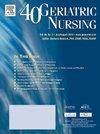Comparing total medical costs of surgical treatment versus nonoperative care for femoral neck fractures among Alzheimer's disease patients: A retrospective cohort study
IF 2.5
3区 医学
Q3 GERIATRICS & GERONTOLOGY
引用次数: 0
Abstract
Objectives
To compare the total medical costs associated with operative versus non-operative medical procedures for femoral neck fractures in older adults with Alzheimer's disease (AD).
Methods
This retrospective cohort study examined 4,157 Optum beneficiaries diagnosed with AD who filed an initial claim for femoral neck fracture between January 1, 2012, and December 31, 2017. Generalized linear regression with Gamma log link function was performed to evaluate total medical costs between surgical treatment and non-operative care while controlling for covariates.
Results
The adjusted total medical costs per patient for arthroplasty and internal fixation were $207,392 and $170,210, exceeding the total medical costs for non-operative cases ($63,041). Comorbidities such as history of falls, sarcopenia/muscle weakness, abnormal weight loss, depression, and fatigue also had a significant impact on the overall medical costs.
Conclusions
Surgical intervention for femoral neck fractures incurs higher costs but offers better clinical outcomes than non-operative care.
比较阿尔茨海默病患者股骨颈骨折手术治疗与非手术治疗的总医疗费用:一项回顾性队列研究
目的:比较老年阿尔茨海默病(AD)股骨颈骨折手术治疗与非手术治疗的总医疗费用。方法:这项回顾性队列研究调查了4157名在2012年1月1日至2017年12月31日期间被诊断为AD的Optum受益人,他们首次提出了股骨颈骨折索赔。在控制协变量的情况下,采用伽马对数链接函数的广义线性回归来评估手术治疗和非手术护理之间的总医疗费用。结果:调整后的关节置换术和内固定的总医疗费用分别为207,392美元和170,210美元,超过了非手术病例的总医疗费用63,041美元。诸如跌倒史、肌肉减少症/肌肉无力、体重异常减轻、抑郁和疲劳等合并症对总体医疗费用也有显著影响。结论:股骨颈骨折的手术治疗费用较高,但临床效果优于非手术治疗。
本文章由计算机程序翻译,如有差异,请以英文原文为准。
求助全文
约1分钟内获得全文
求助全文
来源期刊

Geriatric Nursing
医学-护理
CiteScore
3.80
自引率
7.40%
发文量
257
审稿时长
>12 weeks
期刊介绍:
Geriatric Nursing is a comprehensive source for clinical information and management advice relating to the care of older adults. The journal''s peer-reviewed articles report the latest developments in the management of acute and chronic disorders and provide practical advice on care of older adults across the long term continuum. Geriatric Nursing addresses current issues related to drugs, advance directives, staff development and management, legal issues, client and caregiver education, infection control, and other topics. The journal is written specifically for nurses and nurse practitioners who work with older adults in any care setting.
 求助内容:
求助内容: 应助结果提醒方式:
应助结果提醒方式:


